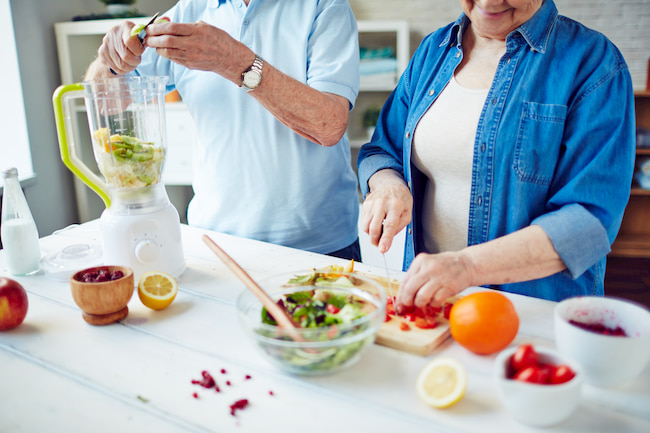When you think about eating at different ages, your metabolism may be the first thing that comes to mind. And it’s true, metabolism does change as we get older. But so do nutritional needs, which is why senior nutrition deserves some extra attention.
It’s logical if you really think about it. Our bodies need different nutrients—and different amounts of those nutrients—at various ages throughout life. This is evident very early in life, as a mom’s breastmilk adjusts nutrients to meet a growing baby’s changing needs.
While the situation is a little different, older adults also have new needs and challenges they’re facing that require a unique nutritional mindset. Let’s take a deeper look into senior nutrition and how a healthy diet can help maintain quality of life for years to come.
Senior nutrition: How physical changes affect diet
As we get older, many things change — we often become less mobile, may experience more chronic health conditions and may even face diminished appetite. Some of those changes and the unique situations older adults face can have a direct impact on senior nutrition.
Older adults may experience:
- Slower metabolism
- Diminished appetite
- Decreased number of taste buds
- Diminished bone density
- Reduced lean body mass
- Malabsorption of certain nutrients
Because of these unique challenges, it’s important for older adults to adjust their eating habits to ensure they continue getting the nutrients needed for optimal health. Since we’re all unique, your nutritional needs may vary somewhat from a friend’s or your spouse’s, but in general, there are some basic guidelines for senior nutrition.
Seniors need:
- Fewer calories overall in most cases
- Increased intake of high-quality protein
- Increased intake of foods containing calcium and vitamin D
- Increased intake of foods fortified with vitamin B12
Along with those nutritional basics, it’s important to seek solutions to help overcome challenges like diminished appetite or taste. That may include talking with a doctor about strategies for boosting appetite and food intake, as well as incorporating different ways of preparing food to make it more flavorful and appealing. If you need help planning or preparing appropriate meals, there are now a number of national and local meal delivery services who provide prepared meals or kits catering to your dietary choices.
Senior nutrition: What it looks like
We went over some of the basics above, but what does that actually look like, in terms of what should be on a senior’s plate? It can be hard to visualize what foods we should be eating and how much of them no matter how old we are!
The good news is that there are plenty of tools out there to help us better understand nutrition. The USDA has a tool called “MyPlate,” which can be used to see what foods you need based on your age and other factors.
While that tool is good for people of all ages, the AARP went a step further — they’ve created a MyPlate for Older Adults.
For the less technologically inclined, let’s break down a senior’s nutritional basics, as outlined in the Dietary Guidelines for Americans.
Fill your plate each day with:
- A rainbow of fruits and vegetables — 1.5 to 2.5 cups of fruits and 2 to 3.5 cups of veggies
- 3 cups of low-fat dairy
- 5 to 10 ounces of whole grains
- 5 to 7 ounces of lean protein
On the flipside, what should you limit in your diet? Steer clear of excess sodium, added sugars and saturated fat.
Senior nutrition: Why it matters
There are many health-related benefits to eating a healthy diet and getting the nutrients you need. Older adults who maintain a healthy diet and work to overcome any nutritional challenges they face will reap the benefits — including feeling better, living longer, being stronger and having a sharper mind.
Beyond the health benefits, though, there are plenty of other benefits, too.
There is pleasure associated with eating and with the social interaction that’s often accompanies eating. The social stimulation, in particular, even boosts your health. Since loneliness and isolation can contribute to poor health, it stands to reason that spending time with others at a meal will do the opposite.
Not sure whether you’re getting the nutrients you need to remain healthy? Check in with your doctor at your next visit and he or she can order bloodwork to check nutritional levels. Need a doctor? Find a primary care physician near you.







